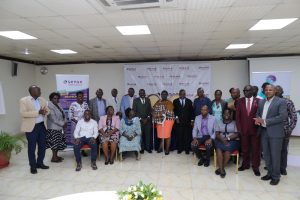In a bold step toward advancing digital inclusion, Sense International Uganda has launched the Global Deafblindness Resource Hub, a first-of-its-kind online platform dedicated to serving individuals living with deafblindness and those who support them.
The launch event, held at Hotel Africana in Kampala on Friday, brought together leaders from government, civil society, and the disability rights community.
The platform, which is fully accessible and freely available, offers a wealth of downloadable content designed to improve access to education, health, and livelihood support for people with deafblindness.
It caters not only to individuals with sensory impairments but also to caregivers, educators, healthcare professionals, and policy actors.
Presiding over the event, Hon. Hellen Grace Asamo, Minister of State for Disability Affairs, called the hub “a milestone not only for the disability sector in Uganda, but also for the global community working towards inclusion, dignity, and equity of persons with disabilities.”
Hon. Asamo emphasized the urgent need for such a platform, citing the many barriers that individuals with deafblindness continue to face—from accessing education and communication to finding employment and achieving full social participation.
“This platform brings together global best practices, local experiences, and practical tools. It is accessible, inclusive, and designed with the input of those it seeks to serve,” she said. “Let it be more than a launch—let it be the beginning of deeper collaboration.”
Edward Otim, Regional Director for East Africa at Sense International, clarified that the resource hub is a digital platform, not a physical center, though its content can be used offline.
“All the content can be downloaded and used without internet once accessed,” Otim explained. “For example, learners can use a digital device called an Orbit reader to access the content in audio form via SD cards.”
He noted that the platform is inclusive of varying degrees of deafblindness—ranging from partial to total vision and hearing loss—and serves multiple audiences including parents, teachers, medical staff, and decision-makers.
“This is a powerful tool,” he said. “It was built after extensive consultations, right from primary beneficiaries to policy stakeholders. Most importantly, it’s free and tailored for those who need it most.”
He also revealed that in collaboration with MTN Foundation, Sense International has established digital access hubs around Uganda, providing free internet so users can engage with the platform without data costs.
One of the event’s most powerful voices was Dr. Abdul, a Sense International board member and lecturer at Kyambogo University, who shared his lived experience as someone born blind.
“Access to information was really difficult. Inclusion was just a dream,” he said. “This resource hub is helping to solve that. It gives people with deafblindness and their communities a chance to learn, grow, and thrive.”
He urged policymakers and community leaders to adopt the hub, saying, “When you open doors of accessibility, you are also opening doors of opportunity.”
Lucy Akech, another speaker at the event, underscored the symbolic importance of the launch coinciding with Helen Keller Day, honoring one of the world’s most celebrated disability rights advocates.
“Helen Keller’s life is a powerful reminder of what’s possible when inclusion and support come together,” Akech said. “Launching this hub today is a quality tribute to her legacy.”
From the education sector, Charles Mugisa, Principal Education Officer for Special Needs in the Ministry of Education, described the hub as a critical milestone.
“This is not just a digital development—it’s a step toward transforming how we achieve inclusive education,” Mugisa said. “We call on all stakeholders to champion and share this resource widely.”
With this pioneering platform, Sense International Uganda has raised the bar for inclusive digital innovation. The Global Deafblindness Resource Hub is expected to drive real change—providing tools, knowledge, and hope to a community that has long been underserved, not just in Uganda, but around the world.